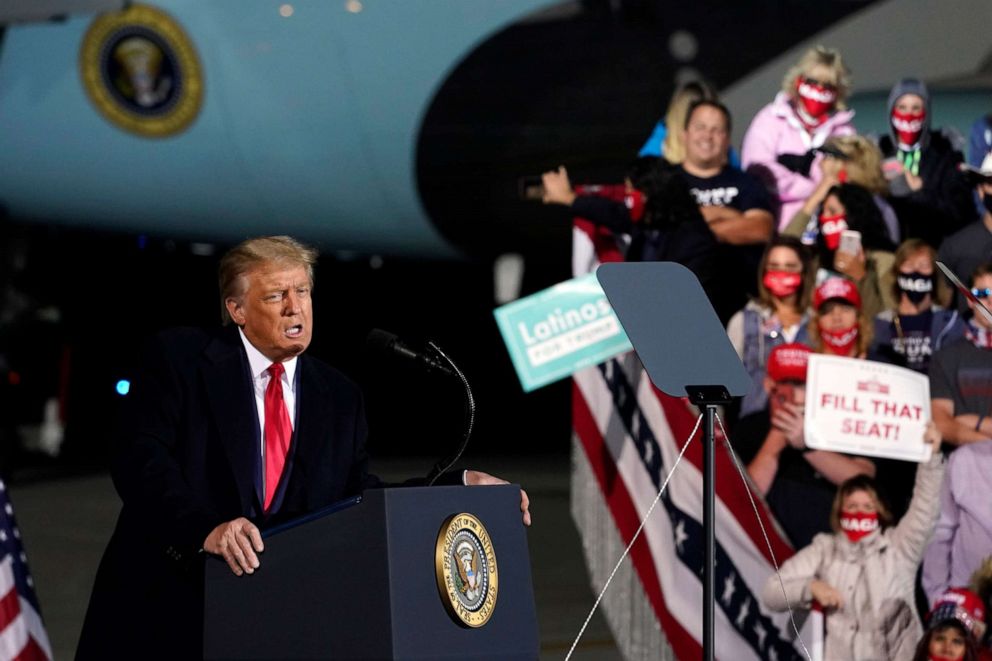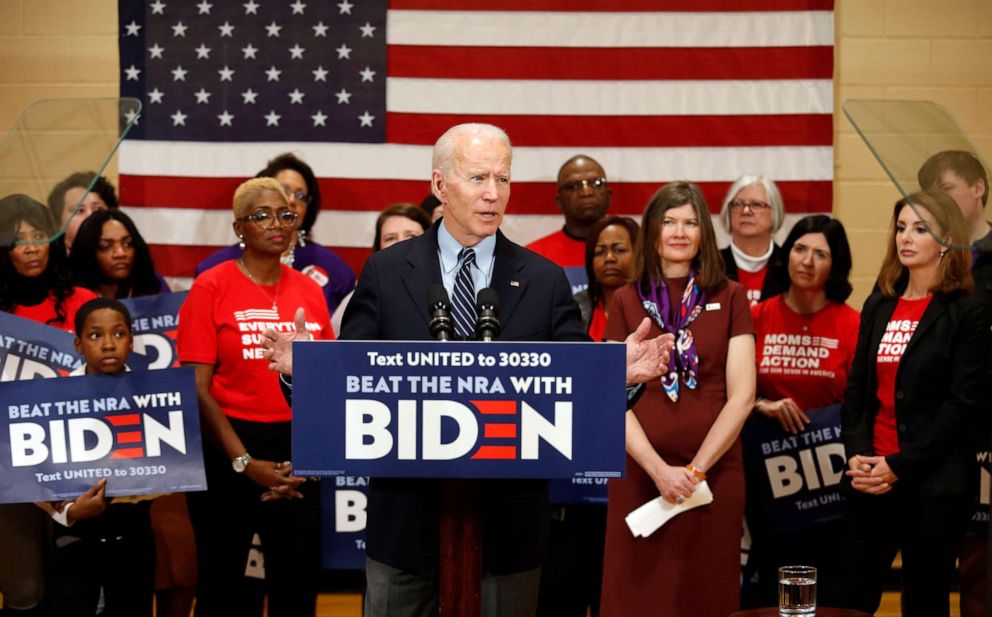Trump, Biden compete for battleground Ohio ahead of 1st debate
No Republican has won the White House without winning Ohio.
Ohio is one of the country’s perennial presidential swing states, one that Democrats and Republicans aggressively compete for every four years.
In an election year reshaped by the coronavirus pandemic, it’s also playing host to a number of legal battles over access to ballot drop boxes, which are increasingly used by voters as an alternative to in-person voting or relying on the United States Postal Service, amid concerns about service delays.
Secretary of State Frank LaRose’s plans to place just one ballot drop box in each of the state’s 88 counties has sparked legal challenges in federal and state court, with Democrats and civil rights groups accusing him of disenfranchising voters in areas like Cuyahoga County, a Democratic stronghold that is home to Cleveland and roughly 860,000 voters.
Already, the state has received nearly 1.8 million absentee ballots requests, compared to roughly 805,844 four years ago.
“Drop boxes are intended to reduce lines and give voters options,” said Vanita Gupta, the president and CEO of the Leadership Conference on Civil and Human Rights. “This seems like an easy fix that people should be supporting, it’s a very practical issue.”
LaRose, who said he personally supports adding more drop boxes, has argued that he is constrained by state law, and has encouraged lawmakers to pass legislation calling for more drop sites.

“As Ohio's chief elections officer, I don't get to make up what the law says, I have to follow the law,” LaRose said in an interview with ABC News on Monday.
After a judge recently ruled against LaRose’s guidance, calling it “arbitrary and unreasonable,” and paved the way for more drop boxes, the secretary of state appealed the injunction that followed the ruling.
On the federal level, a judge has withheld a decision on a second lawsuit challenging LaRose’s drop box policy on constitutional grounds, as the matter plays out in the state appeals court. President Donald Trump’s campaign, the Ohio Republican Party and the Republican National Committee have all entered the fray in opposition to the lawsuit.
State law doesn’t explicitly mention drop boxes, according to Steven Huefner, a professor at the Ohio State University Moritz College of Law, only that voters can personally return their ballots to local election officials, or do so through the mail. LaRose added one drop box at each local Board of Elections office ahead of the primary in April.
“The reality has been that there have been long lines of cars, waiting to get to a dropbox in some locations, but not all locations, so what kind of flexibility should there be for counties to make individual determinations?” Huefner said of the legal debate.
Another lawsuit filed against LaRose by the League of Women Voters, a civic group that encourages women to take a larger role in politics, claimed the signature verification process for absentee ballots was subjective.
Currently in Ohio, to secure absentee ballots, a voter must fill out a form and provide their name, date of birth and signature, among other information, and send it in to the Ohio secretary of state's office.
U.S. District Court Judge Michael Watson said in an order issued Sunday night that while this process is a "moderate burden," voters in Ohio "have multiple options to exercise their right to vote even if their ballot is rejected due to signature mismatch."
A key state for the next president
Despite Republican successes in statewide races in Ohio since 2016, the Buckeye State has become increasingly competitive as Trump and former vice president Joe Biden prepare to face off in Cleveland for their first debate on Tuesday.
In recent weeks Trump and Vice President Mike Pence have traveled repeatedly to Ohio, where they defeated Hillary Clinton and Sen. Tim Kaine, D-Va., her vice presidential candidate, in 2016, 51% to 43%.
Republicans also performed well statewide two years ago, winning the gubernatorial race and other down-ballot contests.
“Ohioans showed up for President Trump in 2016 and we expect them to do the same this November,” Trump campaign spokeswoman Samantha Zager told ABC News.

The president’s campaign has had a permanent presence on the ground in Ohio since 2016, and said they have made more than 10 million voter contacts in the state, where they and other GOP groups continue to canvass on the ground during the coronavirus pandemic.
"The enthusiasm for the president is through the roof," Jane Timken, the chairwoman of the Ohio Republican Party, told ABC News.
"We have counties that I think are going to rack up the numbers, it will be very similar to 2018," she said, noting Republicans' success in statewide races two years ago.
The Biden campaign, meanwhile, has relied on virtual and digital organizing in the state during the pandemic, and has hosted hundreds of events and held 450,000 conversations with voters over the last month.
Biden has delivered a sharp economic message focused on Trump's record, centered on Toledo and Youngstown, home to several car plants and many blue-collar voters who abandoned Democrats and voted for Trump for years ago.
He's run at least eight television ads in recent weeks, including a response to Trump's call for a ban on Goodyear, the Ohio-based tire company than ran in Akron, where the company is based.
"Across the state, our campaign is running a voter contact program focused on quality conversations with voters across Ohio to meet voters where they are and earn every vote," Biden's Ohio state director, Toni Webb, wrote in a memo last week.
Despite the state’s rightward tilt in recent cycles, Ohio Democrats, pointing to Trump’s record on the coronavirus and its impact on the economy, are bullish on their chances to retake the state in November.
They believe that Biden’s Pennsylvania roots and strong performance with Black voters could help him bring together a diverse coalition stretching from the state’s largest cities to their suburbs, and eat into the margins Trump ran up with rural voters on the way to his decisive 2016 victory.
"You can feel things moving on the ground," Rep. Tim Ryan, D-Ohio, who represents Youngstown and the Akron area, told ABC News. "Those voters who voted for Trump because they were against Hillary Clinton, I think, are starting to move into the Biden camp."
While the Biden campaign has spent less here than in some other competitive battlegrounds, Ohio Democratic Party Chair David Pepper is urging the campaign to do more, arguing that the state is “winnable if someone decides to ‘go for it’,” and that a victory would complicate Trump’s path to another four years in the White House. No Republican has ever won the presidency without winning Ohio.
“Unlike other swing states, a blue Ohio on election night, or even in the day or two that follows, greatly eliminates the risk of Trump turning the months that follow the election into a dangerous constitutional meltdown,” he wrote in a memo obtained by ABC News, pointing to the fact that Ohio typically counts its early votes before other Midwestern states.
Biden will campaign in Ohio for the first time since March following Tuesday’s debate, and will travel across eastern Ohio and western Pennsylvania with his wife, Dr. Jill Biden, on a train tour.




